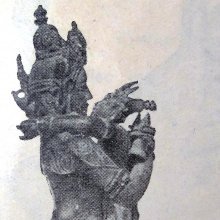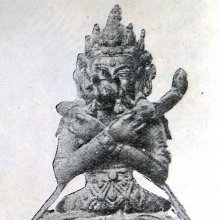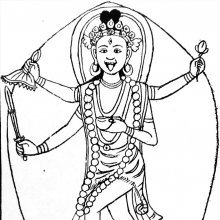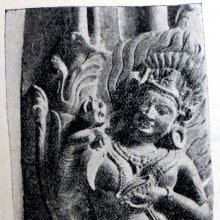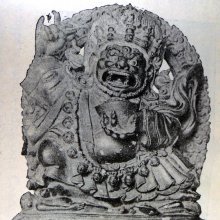Kartri, Kartṛ, Kartrī, Karttri, Karttṛ: 31 definitions
Introduction:
Kartri means something in Buddhism, Pali, Hinduism, Sanskrit, Jainism, Prakrit, the history of ancient India, Hindi. If you want to know the exact meaning, history, etymology or English translation of this term then check out the descriptions on this page. Add your comment or reference to a book if you want to contribute to this summary article.
The Sanskrit terms Kartṛ and Karttṛ can be transliterated into English as Kartr or Kartri or Karttr or Karttri, using the IAST transliteration scheme (?).
Images (photo gallery)
(+18 more images available)
In Hinduism
Vyakarana (Sanskrit grammar)
Source: Shodhganga: Vaiyākaraṇabhūṣaṇasāra: a critical studyKartṛ (कर्तृ).—Agent of an action; subject; name of a kāraka or instrument in general, of an action, which produces the fruit or result of an action without depending on any other instrument.
Source: Wikisource: A dictionary of Sanskrit grammarKartṛ (कर्तृ).—Agent of an action, subject; name of a kāraka or instrument in general, of an action, which produces the fruit or result of an action without depending on any other instrument; cf. स्वतन्त्रः कर्ता (svatantraḥ kartā) P. I.4.54, explained as अगुणीभूतो यः क्रियाप्रसिद्धौ स्वातन्त्र्येण विवक्ष्यते तत्कारकं कर्तृ-संज्ञं भवति (aguṇībhūto yaḥ kriyāprasiddhau svātantryeṇa vivakṣyate tatkārakaṃ kartṛ-saṃjñaṃ bhavati) in the Kāśikā on P.I. 4.54. This agent, or rather, the word standing for the agent, is put in the nominative case in the active voice (cf. P.I.4.54), in the instrumental case in the passive voice (cf P. II.3.18), and in the genitive case when it is connected with a noun of action or verbal derivative noun, (cf. P.II.3.65).

Vyakarana (व्याकरण, vyākaraṇa) refers to Sanskrit grammar and represents one of the six additional sciences (vedanga) to be studied along with the Vedas. Vyakarana concerns itself with the rules of Sanskrit grammar and linguistic analysis in order to establish the correct context of words and sentences.
Purana and Itihasa (epic history)
Source: archive.org: Shiva Purana - English Translation1) Kartṛ (कर्तृ) refers to the “creator”, and represents an epithet of Śiva, according to the Śivapurāṇa 2.2.10. Accordingly as Viṣṇu said to Brahmā:—“[...] Śiva is the creator (kartṛ) of everything, the sustainer (bhartṛ) and destroyer (hartṛ). He is greater than the great. He is the supreme Brahman, the greatest lord, the attributeless, the eternal”.
2) Kartṛ (कर्तृ) refers to a “person who is engrossed in devotion”, according to the Śivapurāṇa 2.2.23. Accordingly as Śiva said to Satī:—“[...] O Goddess Satī, listen, I shall explain the great principle whereby the remorseful creature becomes a liberated soul (mukta). [...] Devotion to me is considered as the bestower of worldly pleasures and salvation. It is achievable only by my grace. It is nine-fold. There is no difference between devotion and perfect knowledge. A person who is engrossed in devotion (kartṛ) enjoys perpetual happiness. Perfect knowledge never descends in a vicious person averse to devotion”.
3) Karttṛ (कर्त्तृ) refers to “one who practices (giving adive)”, according to the Śivapurāṇa 2.3.44 (“Menā regains consciousness”).—Accordingly, as Menā said to her daughter (Pārvatī): “[...] Fie on you. Fie on your intellect. Fie on your beauty and conduct. Fie on your adviser (upadeśa-karttṛ). Fie on your maids too. Fie on us who brought you thus to the world, O daughter. O Nārada, fie on your intelligence and fie on those seven sages who gave us wrong advice. Fie on the whole family. Fie on the efficiency in performing the rites. Fie on everything done by you. You have inflamed this household. Almost it has been a death blow to me. [...]”.

The Purana (पुराण, purāṇas) refers to Sanskrit literature preserving ancient India’s vast cultural history, including historical legends, religious ceremonies, various arts and sciences. The eighteen mahapuranas total over 400,000 shlokas (metrical couplets) and date to at least several centuries BCE.
Nyaya (school of philosophy)
Source: academia.edu: Religious Inclusivism in the Writings of an Early Modern Sanskrit Intellectual (nyaya)Kartṛ (कर्तृ) (Cf. Jayantabhaṭṭa) refers to the “author” (of scriptures), according to Jayanta Bhaṭṭa (ninth–tenth century), the great Naiyāyika from Kashmir, who was a close reader of Kumārila’s work.—[...] Jayanta argues that it is clear from tradition (smṛti), and also on the basis of reason, that no one but Īśvara is the author of Śaiva scriptures. As for Pāñcarātra scriptures, there is just no proof available about their being non-authoritative. Although it may appear that these scriptures were authored by a different deity, namely Viṣṇu, the truth is that the same and unique God, Īśvara, is their author (kartṛ).

Nyaya (न्याय, nyaya) refers to a school of Hindu philosophy (astika), drawing its subject-matter from the Upanishads. The Nyaya philosophy is known for its theories on logic, methodology and epistemology, however, it is closely related with Vaisheshika in terms of metaphysics.
Shaivism (Shaiva philosophy)
Source: Brill: Śaivism and the Tantric Traditions (philosophy)Kartṛ (कर्तृ) refers to the “agent”, according to the Īśvarapratyabhijñākārikā 1.1.2.—Accordingly, “What conscious Self could produce either a refutation or a demonstration [of the existence] of the agent (kartṛ), the knowing subject (jñātṛ), the always already established Self, the Great Lord?”

Shaiva (शैव, śaiva) or Shaivism (śaivism) represents a tradition of Hinduism worshiping Shiva as the supreme being. Closely related to Shaktism, Shaiva literature includes a range of scriptures, including Tantras, while the root of this tradition may be traced back to the ancient Vedas.
Yoga (school of philosophy)
Source: ORA: Amanaska (king of all yogas): A Critical Edition and Annotated Translation by Jason BirchKartṛ (कर्तृ) refers to the “creator” (of the universe), according to the Śivayogadīpikā, an ancient Sanskrit text dealing with Yoga possibly corresponding to the Śivayoga quoted in Śivānanda’s Yogacintāmaṇi.—Accordingly, [while describing a sequence of Haṭhayoga practices]: “Thus, by means of this Haṭhayoga which has eight auxiliaries, those [students who are] life-long celibates obtain the Siddhis of the [best of Sages] because of their untiring practice. [...] In the twelfth year, he is an equal to Śiva and he himself is the creator (kartṛ) and destroyer (hartṛ) [of the universe]. Thus, within twelve years, he easily becomes a perfected one of steady mind because of his devotion at the feet of the true lord of gurus. This is well attested. [...]”.

Yoga is originally considered a branch of Hindu philosophy (astika), but both ancient and modern Yoga combine the physical, mental and spiritual. Yoga teaches various physical techniques also known as āsanas (postures), used for various purposes (eg., meditation, contemplation, relaxation).
Shaktism (Shakta philosophy)
Source: ORA: Amanaska (king of all yogas): (shaktism)Kartṛ (कर्तृ) refers to a “doer” (i.e., one who performs actions), according to the 17th century Kaulagajamardana (“crushing the Kaula elephant”) authored by Kāśīnātha or Kṛṣṇānandācala.—Accordingly, [as Īśvara said to Pārvatī]: “[...] O great Goddess, hear about the Jain. He always carries a pitcher. He is simply a soul and never an enjoyer, doer (kartṛ) and destroyer. He is called a Jain, and Buddhists and [the like] are considered [to be similar]. Some pluck out their hair and dress in white, my dear, and [some] wear red garments and [others wear] indigo and so on. Some are called, 'great guru', and others pursue nonviolence. These are the different varieties in brief; they are [all] called Pāṣaṇḍas [because] they have been excluded from the vedic path. [...]”

Shakta (शाक्त, śākta) or Shaktism (śāktism) represents a tradition of Hinduism where the Goddess (Devi) is revered and worshipped. Shakta literature includes a range of scriptures, including various Agamas and Tantras, although its roots may be traced back to the Vedas.
In Buddhism
Tibetan Buddhism (Vajrayana or tantric Buddhism)
Source: academia.edu: The Structure and Meanings of the Heruka MaṇḍalaKarttṛ (कर्त्तृ) refers to a “knife” and represents one of the items held in the right hand of Heruka: one of the main deities of the Herukamaṇḍala described in the 10th century Ḍākārṇava chapter 15. Heruka is positioned in the Lotus (padma) at the center; He is the origin of all heroes; He has 17 faces (with three eyes on each) and 76 arms [holding, for example, karttṛ]; He is half black and half green in color; He is dancing on a flaming sun placed on Bhairava and Kālarātrī.
Source: OSU Press: Cakrasamvara SamadhiKartri (कर्त्रि) refers to a “sharp cutting knife”, according to the Cakrasaṃvara Samādhi [i.e., Cakrasamvara Meditation] ritual often performed in combination with the Cakrasaṃvara Samādhi, which refers to the primary pūjā and sādhanā practice of Newah Mahāyāna-Vajrayāna Buddhists in Nepal.—Accordingly, “In the Mandala, an obscured Himalaya, abiding seated in lotus posture, [..] the skin of a rutting elephant two-arms’ length of an enormous man, a glittering ax, sharp cutting knife (kartri [karti?]), flaming banner, staff, noose, broad chest, lopped off Brahma heads, with firewood, with a skull bowl, with shining arms, and beautiful pride, [...] a helper for crossing over together, the dreadful wilderness of saṃsāra, routing Māra, Śrī Vajrasattva, homage”.

Tibetan Buddhism includes schools such as Nyingma, Kadampa, Kagyu and Gelug. Their primary canon of literature is divided in two broad categories: The Kangyur, which consists of Buddha’s words, and the Tengyur, which includes commentaries from various sources. Esotericism and tantra techniques (vajrayāna) are collected indepently.
Mahayana (major branch of Buddhism)
Source: academia.edu: A Study and Translation of the GaganagañjaparipṛcchāKartṛ (कर्तृ) refers to an “agent”, according to the Gaganagañjaparipṛcchā: the eighth chapter of the Mahāsaṃnipāta (a collection of Mahāyāna Buddhist Sūtras).—Accordingly, “Gaganagañja said: ‘Son of good family, if a certain agent (kartṛ) is in conditions, the dharmas will be born, but, because any agent is not apprehended in conditions, the agent is not apprehended in any dharma’. Ratnaśrī said: ‘Son of good family, what is it that the Tathāgata never appears?’ Gaganagañja said: ‘if suchness arises, the Tathāgata will appear, but still we hold the view that suchness never arises. Why is that? Suchness is brought about through non-arising. One who understands all dharmas just like the suchness, he is called the Tathāgata’. Ratnaśrī said: ‘Son of good family, why did the Tathāgata come?’ [...]”

Mahayana (महायान, mahāyāna) is a major branch of Buddhism focusing on the path of a Bodhisattva (spiritual aspirants/ enlightened beings). Extant literature is vast and primarely composed in the Sanskrit language. There are many sūtras of which some of the earliest are the various Prajñāpāramitā sūtras.
In Jainism
General definition (in Jainism)
Source: The University of Sydney: A study of the Twelve ReflectionsKartṛ (कर्तृ) refers to “those who perform (the doctrine)”, according to the 11th century Jñānārṇava, a treatise on Jain Yoga in roughly 2200 Sanskrit verses composed by Śubhacandra.—Accordingly, “[com.—Next he speaks about the reverence of the chief of the gods (devendrapūjyatvam) for those who perform the doctrine (dharmakartṛṇāṃ)]—The thirty gods, whose heads are bowed, bow down to the line of lotus feet of those whose hearts have become a refuge only for the doctrine. That very same doctrine, which is devoted to the helpless, is a preceptor and a friend, and the doctrine is a master and a brother. It is a protector without a motive”.

Jainism is an Indian religion of Dharma whose doctrine revolves around harmlessness (ahimsa) towards every living being. The two major branches (Digambara and Svetambara) of Jainism stimulate self-control (or, shramana, ‘self-reliance’) and spiritual development through a path of peace for the soul to progess to the ultimate goal.
India history and geography
Source: Cologne Digital Sanskrit Dictionaries: Indian Epigraphical GlossaryKartṛ.—(CII 3, etc.), the maker; a technical term for the composer of a record, as opposed to the person who reduced it to writing. Cf. Karttār (EI 33), Tamil; an officer. Note: kartṛ is defined in the “Indian epigraphical glossary” as it can be found on ancient inscriptions commonly written in Sanskrit, Prakrit or Dravidian languages.

The history of India traces the identification of countries, villages, towns and other regions of India, as well as mythology, zoology, royal dynasties, rulers, tribes, local festivities and traditions and regional languages. Ancient India enjoyed religious freedom and encourages the path of Dharma, a concept common to Buddhism, Hinduism, and Jainism.
Languages of India and abroad
Sanskrit dictionary
Source: DDSA: The practical Sanskrit-English dictionaryKartrī (कर्त्री).—
1) Knife.
2) Scissors.
See also (synonyms): kartrikā.
--- OR ---
Kartṛ (कर्तृ).—a. or s. [कृ-तृच् (kṛ-tṛc)] कर्ताहमिति मन्यते (kartāhamiti manyate) Bhagavadgītā (Bombay) 3.27.
1) A doer, one who does, makes, performs &c., an agent; वंशस्य° (vaṃśasya°) R.2.64; व्याकरणस्य कर्ता (vyākaraṇasya kartā) author of Grammar ऋणस्य कर्ता (ṛṇasya kartā) one who incurs debt; हितकर्ता (hitakartā) a benefactor; सुवर्णकर्ता (suvarṇakartā) a goldsmith &c.
2) (In gram.) An agent (the meaning of the instrumental case).
3) The Supreme Spirit.
4) An epithet of Brahmā.
5) Name of Viṣṇu and Śiva also.
6) A priest.
Source: DDSA: The practical Sanskrit-English dictionaryKartr (कर्त्र्).—(= katr) 1 P. To dissolve (kartrayati sindūraṃ tailena).
See also (synonyms): kartt.
Source: Cologne Digital Sanskrit Dictionaries: Shabda-Sagara Sanskrit-English DictionaryKarttṛ (कर्त्तृ).—mfn. (-rttā-rttrī-rttṛ) 1. An agent, a doer, a maker, one who makes or does. 2. One who practises what he knows. m.
(-rttā) 1. A name of Brahma. 2. (In grammar,) The active noun, the nominative case. E. kṛ to do, and tṛc affix: it may also be read kartṛ.
Source: Cologne Digital Sanskrit Dictionaries: Shabda-Sagara Sanskrit-English DictionaryKartr (कर्त्र्).—[kartra] r. 10th cl. (kartrayati) To unloose, to remove: see kartta.
Source: Cologne Digital Sanskrit Dictionaries: Shabda-Sagara Sanskrit-English DictionaryKartrī (कर्त्री).—f. (-rtrī) A scissors. E. kṛt to cut, tṛc and ṅīṣ affs.
Source: Cologne Digital Sanskrit Dictionaries: Benfey Sanskrit-English DictionaryKartṛ (कर्तृ).—i. e. kṛ + tṛ, m., f. trī, and n. 1. An agent, a maker, [Rāmāyaṇa] 4, 24, 5; [Mānavadharmaśāstra] 4, 172; 3, 160; 5, 105 (n.); [Kathāsaritsāgara, (ed. Brockhaus.)] 25, 153 (f.). 2. A founder, Mahābhārata 13, 1662. 3. Creator, [Rāmāyaṇa] 3, 69, 7. 4. An author, [Pañcatantra] ii. [distich] 34.
Source: Cologne Digital Sanskrit Dictionaries: Benfey Sanskrit-English DictionaryKartr (कर्त्र्).—or kart Kart, or katr Katr, i. 10, [Parasmaipada.] To loosen (akin to kṛt, a denominative).
Source: Cologne Digital Sanskrit Dictionaries: Cappeller Sanskrit-English DictionaryKartṛ (कर्तृ).—[masculine] doer, accomplisher, creator, author, officiating priest; making, causing, working at (—°); facturus; the agent or spontaneous performer of an action ([grammar]).
Source: Cologne Digital Sanskrit Dictionaries: Cappeller Sanskrit-English DictionaryKarttṛ (कर्त्तृ).—1. [masculine] destroyer.
--- OR ---
Karttṛ (कर्त्तृ).—2. [masculine] spinner.
Source: Cologne Digital Sanskrit Dictionaries: Monier-Williams Sanskrit-English Dictionary1) Karttṛ (कर्त्तृ):—[from karta] 1. karttṛ mfn. one who cuts off
2) [v.s. ...] one who extinguishes, a destroyer, [Vīracarita]
3) Karttrī (कर्त्त्री):—[from karta] f. idem
4) Karttṛ (कर्त्तृ):—[from kartana] 2. karttṛ mfn. one who spins, a spinner, [Mahābhārata viii.]
Source: Cologne Digital Sanskrit Dictionaries: Monier-Williams Sanskrit-English Dictionary1) Kartṛ (कर्तृ):—[from kartave] mfn. one who makes or does or acts or effects, a doer, maker, agent, author (with [genitive case] or [accusative] or ifc. cf. bhaya-kartṛ, etc.), [Ṛg-veda; Atharva-veda] etc., [Mahābhārata; Manu-smṛti] etc.
2) [v.s. ...] doing any particular action or business, applying one’s self to any occupation (the business or occupation preceding in the compound cf. suvarṇa-kartṛ, rājya-k, etc.)
3) [v.s. ...] one who acts in a religious ceremony, a priest, [Śatapatha-brāhmaṇa; Āśvalāyana-gṛhya-sūtra] etc.
4) [v.s. ...] m. the creator of the world, [Śatapatha-brāhmaṇa xiv; Yājñavalkya iii, 69]
5) [v.s. ...] Name of Viṣṇu, [Pañcatantra]
6) [v.s. ...] of Brahman, [cf. Lexicographers, esp. such as amarasiṃha, halāyudha, hemacandra, etc.]
7) [v.s. ...] of Śiva, [cf. Lexicographers, esp. such as amarasiṃha, halāyudha, hemacandra, etc.]
8) [v.s. ...] (in [grammar]) the agent of an action (who acts of his own accord [sva-tantra]), the active noun, the subject of a sentence (it stands either in the [nominative case] [in active construction], or in the [instrumental case] [in passive construction], or in the [genitive case] [in connection with a noun of action]; it is opposed to karman, the object), [Pāṇini] etc.
9) [v.s. ...] one who is about to do, one who will do (used as periphr. [future]), [Mahābhārata]
Source: Cologne Digital Sanskrit Dictionaries: Monier-Williams Sanskrit-English DictionaryKartr (कर्त्र्):—[class] 10. [Parasmaipada] kartrayati, to unloose, remove, [Dhātupāṭha xxxv, 60] (perhaps connected with √1. kṛt).
Source: Cologne Digital Sanskrit Dictionaries: Yates Sanskrit-English DictionaryKarttṛ (कर्त्तृ):—[(rttā-rttrī-rttṛ) a.] Acting, doing. m. Brahmā; an agent.
Source: Cologne Digital Sanskrit Dictionaries: Yates Sanskrit-English DictionaryKartrī (कर्त्री):—(rtrī) 3. f. Pair of scissors.
Source: DDSA: Paia-sadda-mahannavo; a comprehensive Prakrit Hindi dictionary (S)Karttṛ (कर्त्तृ) in the Sanskrit language is related to the Prakrit words: Kaṭṭu, Kattu.
Source: DDSA: Paia-sadda-mahannavo; a comprehensive Prakrit Hindi dictionary (S)Kartṛ (कर्तृ) in the Sanskrit language is related to the Prakrit word: Katti.
[Sanskrit to German]
Sanskrit, also spelled संस्कृतम् (saṃskṛtam), is an ancient language of India commonly seen as the grandmother of the Indo-European language family (even English!). Closely allied with Prakrit and Pali, Sanskrit is more exhaustive in both grammar and terms and has the most extensive collection of literature in the world, greatly surpassing its sister-languages Greek and Latin.
Hindi dictionary
Source: DDSA: A practical Hindi-English dictionaryKartṛ (कर्तृ):——an allomorph of the word [karttā] used as the first member in compound words; ~[pradhāna vākya] (a sentence) wherein the subject dominates; ~[vācaka] a term that denotes the subject; ~[vācya] the active voice.
...
Kannada-English dictionary
Source: Alar: Kannada-English corpusKartṛ (ಕರ್ತೃ):—
1) [noun] a person who does, performs or carries out a work; a doer.
2) [noun] a master; a owner; a ruler.
3) [noun] the man who originates, creates or initiates something.
4) [noun] (gram.) the noun or other substantive that is one of the two immediate constituents of a sentence and about which something is said in the predicate and with which the verb agrees; a subject.
Kannada is a Dravidian language (as opposed to the Indo-European language family) mainly spoken in the southwestern region of India.
See also (Relevant definitions)
Starts with (+19): Kartrabhipraya, Kartribhuta, Kartridhara, Kartriga, Kartrigamin, Kartrigupta, Kartriguptaka, Kartrika, Kartrikahasta, Kartrikara, Kartrikarman, Kartrikastra, Kartrikatva, Kartrima, Kartrimant, Kartrimat, Kartripada, Kartripura, Kartrisadakhya, Kartrisadhana.
Ends with (+113): Adikartri, Akartri, Akritakartri, Alamkartri, Alankartri, Ambakartri, Anagatakartri, Anandaprakartri, Annasamskartri, Antakartri, Anugrahakartri, Anukartri, Anyakartri, Apakartri, Arthakartri, Bandhakartri, Bhayakartri, Bhayamkartri, Bhinnakartri, Bhutakartri.
Full-text (+249): Kattu, Katr, Kart, Kartrivacya, Sharirakartri, Katti, Vicarakarttri, Sarvakarttri, Sandhanakarttri, Granthakarttri, Mishtakarttri, Karttrivacya, Shalyakarttri, Shantikarttri, Kartrika, Kartritva, Suvarnakartri, Bandhakartri, Punyakartri, Rajyakartri.
Relevant text
Search found 48 books and stories containing Kartri, Kartṛ, Kartrī, Karttri, Karttṛ, Karttrī, Kartr; (plurals include: Kartris, Kartṛs, Kartrīs, Karttris, Karttṛs, Karttrīs, Kartrs). You can also click to the full overview containing English textual excerpts. Below are direct links for the most relevant articles:
Sahitya-kaumudi by Baladeva Vidyabhushana (by Gaurapada Dāsa)
Text 7.48 < [Chapter 7 - Literary Faults]
Text 11.14 < [Chapter 11 - Additional Ornaments]
Text 2.10 < [Chapter 2 - The Natures of Words (śabda)]
The Indian Buddhist Iconography (by Benoytosh Bhattachacharyya)
Figure 191 - Emanations of Ratnasambhava: Vajrayoginī
Figure 138-139 - Emanations of Akṣobhya: Ekajaṭā
Vakyapadiya of Bhartrihari (by K. A. Subramania Iyer)
Verse 3.14.559 < [Book 3 - Pada-kāṇḍa (14): Vṛtti-samuddeśa (On Ccomplex Formation)]
Taittiriya Upanishad Bhashya Vartika (by R. Balasubramanian)
Verse 2.418 < [Book 2 - Brahmavallī]
Vasudevavijaya of Vasudeva (Study) (by Sajitha. A)
Kāraka (b): Hetu < [Chapter 3 - Vāsudevavijaya—A Grammatical Study]
Kāraka (a): Kartṛkāraka < [Chapter 3 - Vāsudevavijaya—A Grammatical Study]
Kāraka (f): Apādāna < [Chapter 3 - Vāsudevavijaya—A Grammatical Study]
